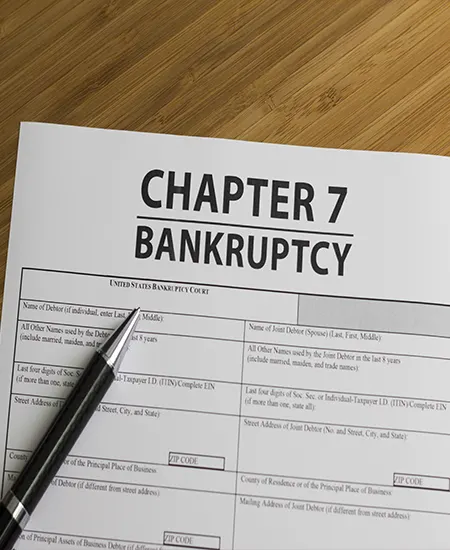Chapter 7 of the federal bankruptcy code is the liquidation option in which individuals and businesses see their nonexempt assets sold off to satisfy creditors. Under Chapter 13, individuals (businesses must use Chapter 11) can reorganize their debts and pay them off over three to five years.
Both options can seem pretty scary. Just the word itself – “bankruptcy” – equates in many people’s minds with failure and the loss of everything. However, even in Chapter 7, filers can often retain their homes and cars depending on their state’s exemption laws.
If debts are overwhelming you, and the phone is ringing off the hook with demands for payment, you should consider your bankruptcy options. Bankruptcy does indeed result in a fresh start, both financially and personally.
COFFYLAW, LLC combined with BOYER COFFY, a highly respected boutique law firm specializing in Business Law, Immigration, and Complex Chapter 13, have doubled our IP and Business Practices with four offices in highly competitive markets within the Tri-State area. COFFYLAW, LLC has helped individuals, families, and businesses across the country achieve their fresh start through bankruptcy. With offices in Brooklyn, New York, and in Maplewood and Clifton, New Jersey, the firm serves clients throughout the Tri-State Area, as well as nationwide. Additionally, COFFYLAW has deepened its experience in cybersecurity and Artificial Intelligence (AI) to prepare itself to serve clients in this ever-changing dynamic space.
Most people tend to choose Chapter 7 over Chapter 13 when opting for bankruptcy. The reasons are many, including the size and nature of the debts the filers owe. A Chapter 7 is the cleanest of the options and typically can be over and done with in about six months, compared to three to five years for Chapter 13.
Chapter 7 is known as the liquidation option, which does sound frightening on the surface, but both the federal government and the state where you reside offer exemptions. Some states’ exemptions are more generous than others, but they are part and parcel of a Chapter 7 liquidation.
In New York, for instance, depending on the county where you reside, you can exempt up to $179,750 in your primary residence’s equity. Say you have $200,000 equity in your home; only $20,250 is nonexempt. Equity in a car is exempt up to $4,825 or $11,975 if the vehicle is owned or operated by a disabled person. Pensions, public benefits, and retirement savings are also exempt (in every state).
New York is also one of the few states that allow you to choose either the state exemptions or the federal exemptions, but you can’t mix and match. The federal exemptions for home and car, however, are lower; only $25,150 for a home ($50,300 if co-owned by spouses) and $4,000 for a car.
There is an income means test associated with a Chapter 7 bankruptcy filing. Some who attempt a Chapter 7 may find that their income is high enough that they qualify only for a reorganization plan.
In filing for Chapter 7 protection, you must complete two forms: Form 122A-1, Statement of Your Currently Monthly Income, and Form 122A-2, Means Test Calculation. To qualify for Chapter 7, your income must be less than the median income for a household of the same size in your state.
According to the latest figures from the U.S. Department of Justice (DOJ), the median income in New York for a single person is currently $60,696 and for a family of four, $112,424. For New Jersey, the comparable numbers are $71,941 and $134,345.
Chapter 7 may be the only option if your income has fallen so low, or even disappeared, that you cannot meet your monthly living expenses.
Assuming this is not the case, Chapter 7 is a good option when you can retain most or all of your exempt assets (home, vehicle, and other essentials) and simultaneously shed the burden of your unsecured loan obligations. Chapter 7 is by far the quickest solution under the bankruptcy umbrella, letting you put your past behind you quickly and start working toward a brighter future.
Once you qualify for a Chapter 7 filing, the court will issue what is called an “automatic stay.” Your creditors will be ordered to cease contact with you and stop all repossession and foreclosure activities. However, for secured debts like homes and automobiles, the creditors can request permission to proceed with taking back their collateral assets.
This means if you’re behind in payments, you’re going to have to make up the arrears amounts or arrange for a refinancing if you wish to retain those assets (provided they fall under your state’s equity exemption limit).
A trustee will be assigned to your case, and that person will handle all creditor inquiries or demands. There will also be a meeting of creditors that you must attend. The trustee will then arrange to sell your nonexempt assets and pay creditors with whatever proceeds are obtained. At the end of the process, you will be discharged from bankruptcy, and you can begin your life afresh.
Your unsecured debts will be mostly gone, but note that certain obligations cannot be discharged under any bankruptcy filing. These include most student loans, alimony and child support, and most tax liabilities.
Though it’s possible to pursue a bankruptcy filing on your own, it is certainly not advised. You can easily miss a step, get lost in the administrative and documentary requirements, and on top of that, suffer personally under stress and emotional trauma. You should let an experienced Chapter 7 attorney guide you through the process and help you meet all the paperwork and other requirements.

COFFYLAW, LLC stands ready to help you in achieving your fresh start through Chapter 7. We have offices in New York and New Jersey, but also counsel clients nationwide. Contact us immediately when your debt obligations get out of hand, and we will help on your road to financial recovery.